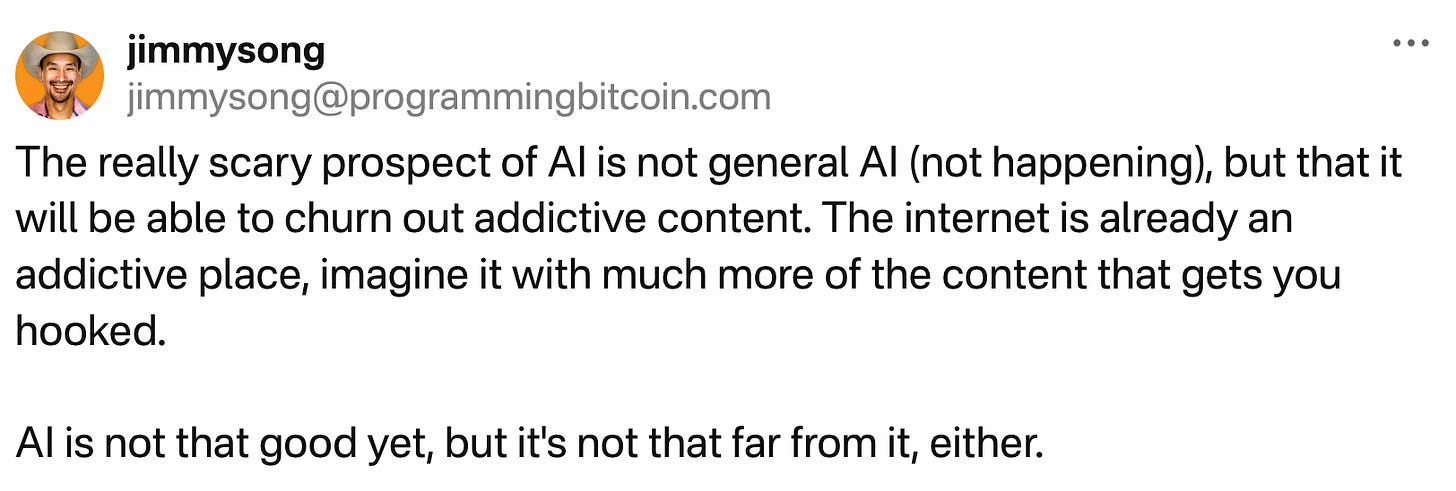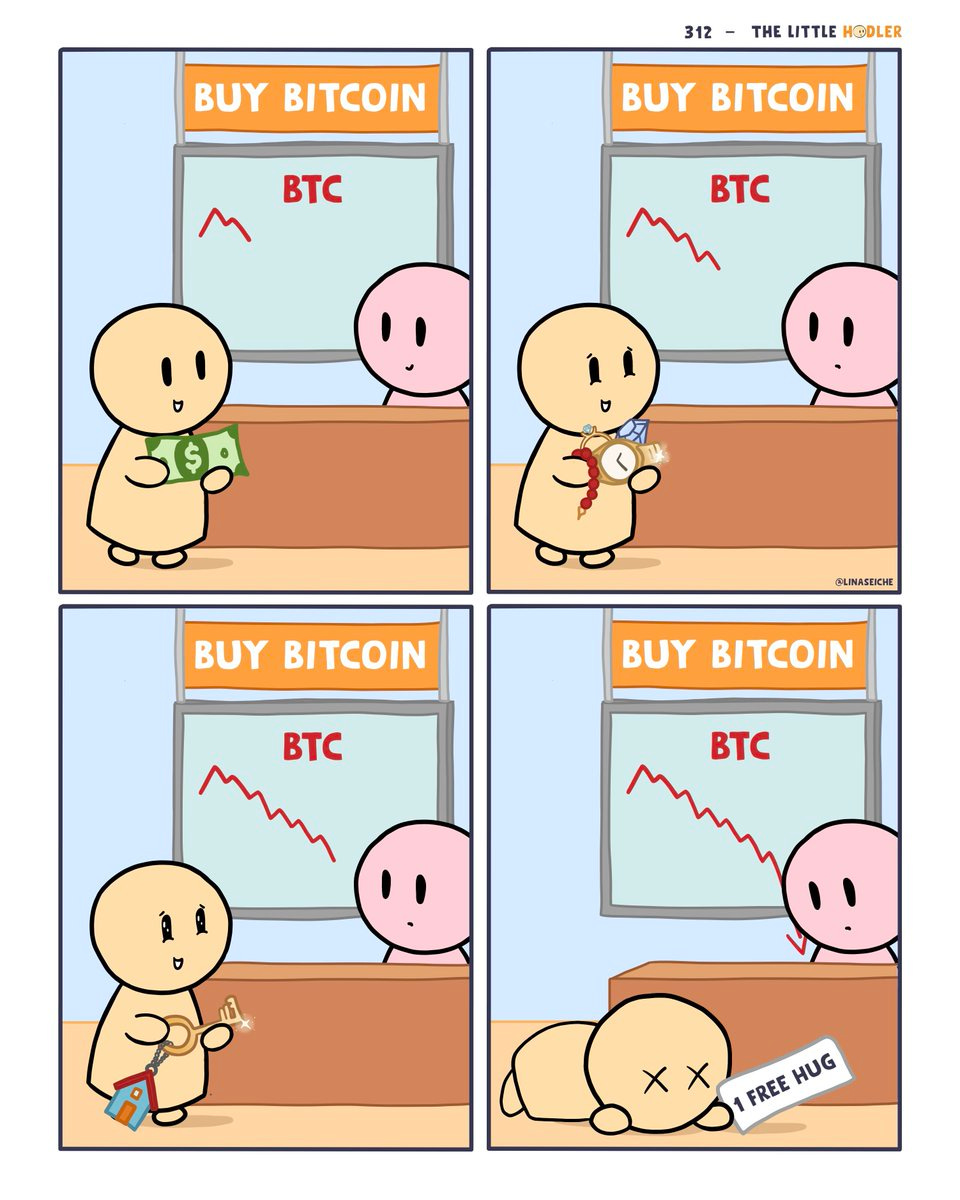Bitcoin Tech Talk #445
Interesting Stuff
Midwit Industrial Complex - The article is an excellent distillation of what happens when you have too many rent-seekers. The article is worth reading for the title phrase alone, which is just too fitting. The phrase describes not just bureaucrats of all different stripes, but also academics, politicians and VCs. The main characteristic of this group is an aversion to crossing any red lines drawn by those in authority, being skilled players in the status game, and of course, ridiculing and being disgusted at anything outside the Overton Window. These are your Cantillon winners and they control the money in a fiat system.
Zero-sum Mentality - This article from mises.org is about overpopulation and how that’s shaped government policy the decades following the Malthusian uproar of the 60’s. The most insightful bit was about the essential error here being one of thinking the world as zero-sum. That is, thinking that everything stays static as demands and desires change. Such analysis is easy to perform and make for lots of academic papers and grants, but has little bearing on reality. Humans are not zero-sum and have the capacity to create value. Yet, I understand why people would have this mentality as fiat systems naturally create zero-sum dynamics with money printing, where the winners come at the expense of losers.
Not Trusting Elites - A delicious, satirical screed of this quality deserves to be spread far and wide. Whatever you think of tariffs, the article points out that the elites’ disdain of tariffs makes everyone else wonder if there’s something to them. We’ve had so much disinformation from the elites and so much of their disdain over the past decade, particularly since COVID that we all instinctively distrust their arguments by default. In other words, the Wilson-era technocratic dream is on its last legs. A dream, that not coincidentally started with the Federal Reserve.
Grounding and Doubt - The article is about how the author and her cohort never really learned values like loyalty, trust and grit in large part because they’ve been taught that doubt should be the default. For me, the article explained well the moral confusion of nihilistic narcissism which the current generation of young women have been born into. Essentially, they’ve been taught the external qualities that they should be seeking without any of the underlying virtues which give rise to those qualities. This is the result of doubt penetrating so deep that there’s no grounding truth to hold onto, a situation that’s parallel to the reality of fiat money.
Increasing Activation Energy - If you’re like me, the hardest part of getting a task done is getting started. It’s easy enough to finish once you have momentum on a task, but that initial activation can be like pulling teeth with your mind. I found this article a good summation of the actual reasons why I avoid certain tasks, and perhaps you will find it useful, too. The main one is the instant gratification seeking, which unfortunately is way too plentiful in an attention economy.
What I'm up to
Youthful Despair - I wrote this article as a bit of a reflection on Holy Week and the despair that so many young people have and how it’s been a fairly common sentiment for the have-not youth. What we seem to have now is a large number of have-not youth, but they’re also pretty gas-lit into believing the people that keep them down are on their side. How long can this last is the question.
BTC Prague - I will be at this amazing Bitcoin conference over the summer in June. It’s in a great city and the lineup is always top-notch. If you’re in Europe or have always wanted to visit this country, I would recommend coming.
Friends and Family BBQ - Thank God for Bitcoin will be hosting this event May 27th around lunchtime. I’ll give a 30 minute talk and there will be plenty of meat. If you’re in Vegas anyway, consider attending this so you can resist the temptations that are sure to come the following days.
Nostr Note of the Week
What I’m Promoting
Bitcoin
DahLIAS - This is a new paper released by Blockstream research which has significant implications for Cross-Input-Signature-Aggregation (CISA) among other things. The main idea here is to aggregate n messages and n pubkeys that signed them into a single Schnorr signature that can be verified. If each message was signed correctly for each pubkey, then the aggregate signature will verify, but if even one message was signed wrong, then the aggregate signature will not verify. The tricky part is that it’s a two-round protocol, but the first round does not need the messages to be sent out, meaning if planned ahead, it can be a single-round protocol. In addition to CISA benefits, the validation is also faster than checking n signatures.
Wallet Clustering - The Spiral blog post is about wallet clustering, or figuring out which addresses are owned by the same entity and it’s a good way to learn the history of the heuristics chain-analysis companies have used to identify them. What was particularly interesting to me was the last part of the article with respect to wallet fingerprinting. Certain wallets have a certain way of constructing transactions, making them easier to identify and thus giving more data to de-anonymize transactions. The article is worth reading, especially if you’re interested in on-chain privacy.
Erk - This is an interesting innovation on Ark in that it eliminates the need for liveness, which is another way of saying that the users need to be online for transactions that are often not directly related to them. The notion itself is interesting in that each user provides a signature before going offline that can be used in place of the liveness requirement in Ark. Unfortunately, this protocol requires OP_CTV, which may or may not come onto the Bitcoin network.
Spending Policy Cosigning - ColdCard has a new feature that lets you set a particular policy for cosigning a transaction. The main idea is that you can set limits on the kinds of transactions the device will sign by having a separate signer on the device which acts as something like an accountant that checks to make sure you’re not doing anything dumb. What’s a little scary about this is that once the spending policy is set, it cannot be changed, which can be both good ($5 wrench attack is limited) and bad (you may get stuck not being able to get the thing to sign when you really need it). In a way this mimics some covenants functionality without the actual on-chain changes.
Lightning
OpenSats LN Grant Progress - OpenSats has made a lot of different grants to different organizations for Lightning development and in this post, they go through all the progress these projects have made and what they’ve meant for the lightning network. A lot of these are infrastructure tools that help builders build and minimize the pain of development. It’s great that an organization like this exists to support these things because God knows how hard it would be to sell the public on funding some of these things through a kickstarter.
BitGiver - You would think that giving people money would be relatively easy on a decentralized network, but honestly it’s not. There are a lot of different ways and tradeoffs of each one, many requiring a lot of software that needs to not just be live all the time, but maintained. This is another project that aims to make this a little easier for anyone that wants to accept donations, largely through the lightning network.
On-chain Data Sourcing for Lightning Nodes - All lightning nodes need access to on-chain data, whether it’s for force-closes or justice transactions or channel openings, nodes need on-chain data and sourcing that data is a critical part of any lightning node. This post goes through the various options and the tradeoffs of each one. It’s a little biased toward using LDK for a lot of the data, but it’s a good place to understand how lightning nodes need to be architected for this critical component.
Economics, Engineering, Etc.
Mining Centralization Report - 0xB10C attempts to quantify miner centralization in this post, using various blockchain analysis tools. There are various measurements of which pools dominate, using coinbase tags and going further by looking at which pools are likely to be under the same corporate umbrella by the block templates they use. As can be seen above the top mining pool is still AntPool after all these years, and the top 6 have over 90% of the hashing power.
Tether Deploying to Ocean - Speaking of mining, Ocean is not one of the top 6 and has been rapidly gaining in hash power. Tether is the latest to join their pool, and given that they have significant resources at their disposal, this should be a big win for at least federating mining. I’m still puzzled by why more companies aren’t mining on Ocean, but I suspect that as their hashing power increases, the variance of blocks will decrease, making payouts a little more consistent, and given that they generally pay out more than other pools, their popularity will only increase over time in a virtuous cycle.
Smart Contract “Hacker” - What happened here is that someone that could spot bugs in smart contracts managed to get a bunch of money from a smart contract that had a bug. The bug-finder thinks he gets to keep the money because he the contract is the contract, but the authorities think he’s “hacking.” The framing of this article is highly negative of the Canadian teen, as would be expected from a mainstream outlet. On the one hand, I think the teen is like any smart contract lawyer, and good for him for finding an unintended code path. On the other hand, these platforms have always been centralized and this is where they can use raw power to come get you for upsetting the wrong people.
Quick Hits
3459 BTC - Another week, another fat stack for Strategy.
Requirements of Bitcoining - The post asks the questions the unwritten requirement that to use Bitcoin you need to be a Bitcoiner.
Satoshi Emails - Marti Malmi’s trove of emails with the Bitcoin creator.
QDay Prize - 1 BTC for a quantum computer that breaks the biggest ECC key using Shor’s Algorithm.
Fiat delenda est.







